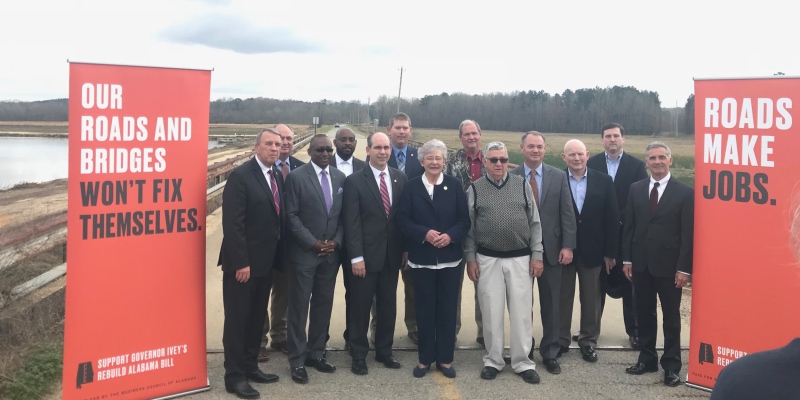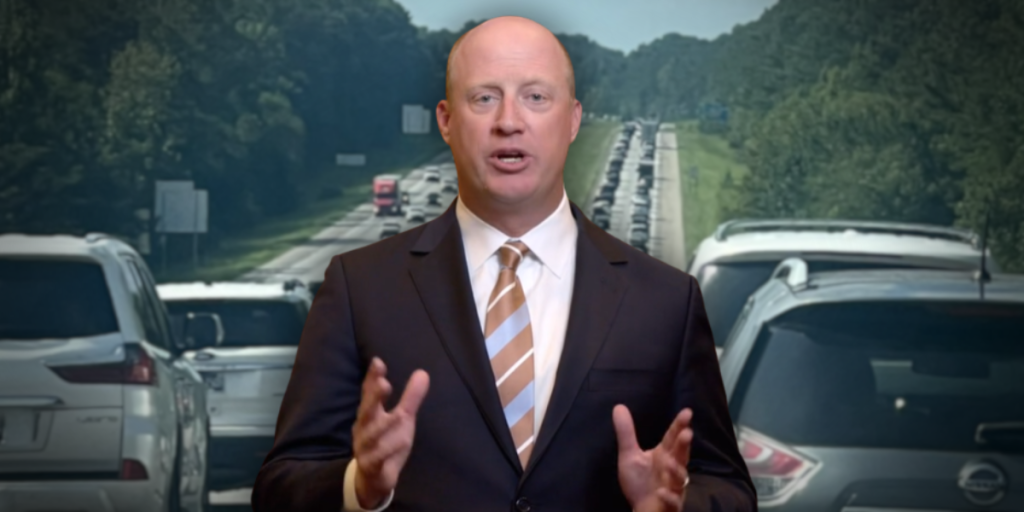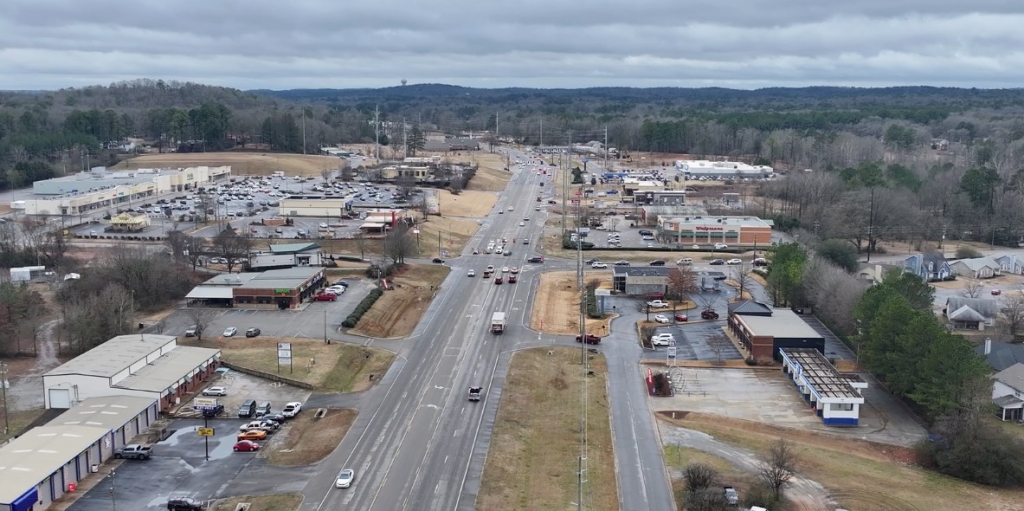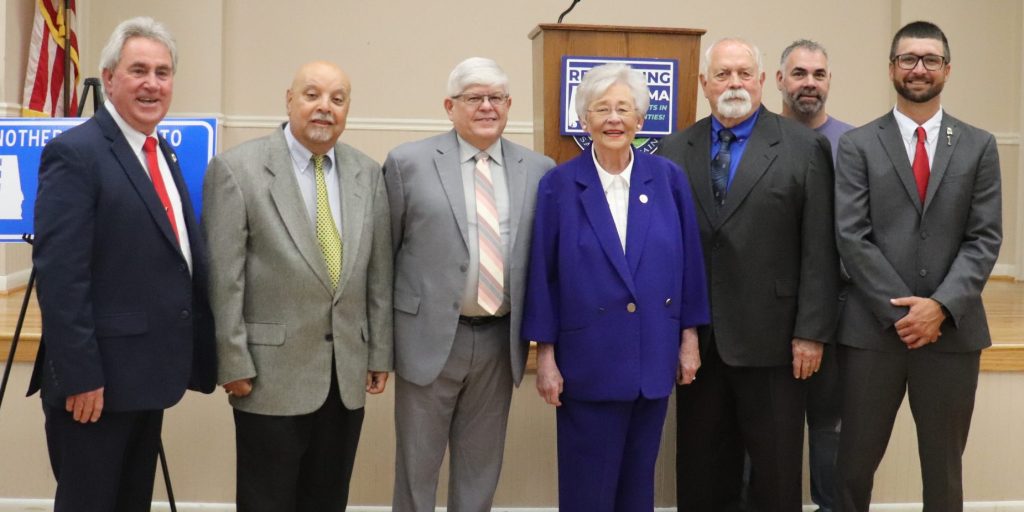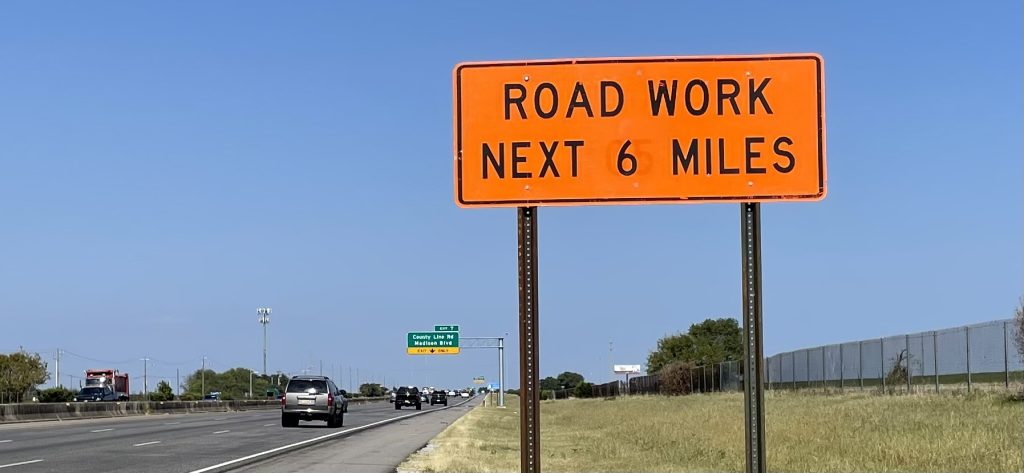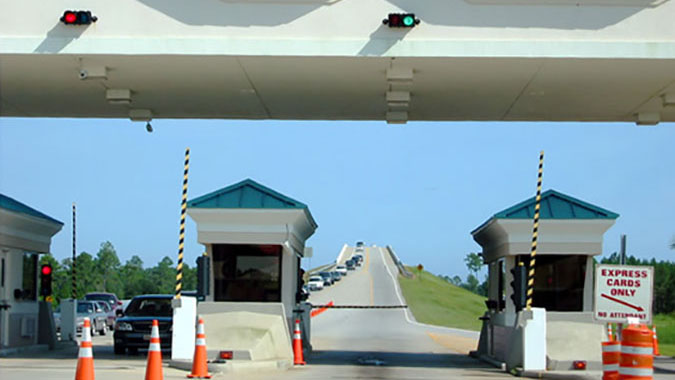MAPLESVILLE — Next to a crumbling rural road and a deficient old bridge, Governor Kay Ivey on Wednesday began to make the case for her “Rebuild Alabama” plan.
With key legislative leaders, stakeholders and job creators firmly behind her, Ivey declared, “Y’all, this is an issue felt by every Alabamian. … The fact of the matter is that Alabama must – absolutely must – address this problem, and to be successful, we’ve got to tackle it together.”
The governor is proposing a 10 cents-per-gallon fuel tax in addition to the currently imposed flat excise tax of 18 cents-per-gallon on gas and 19 cents-per-gallon on diesel. The 10 cents would be phased in over three years — six cents immediately, two more cents in 2020 and the final two cents in 2021. After this phase-in, the tax would be indexed to coincide with the rising costs of building roads. The index would raise the tax no more than one cent every two years.
While 37 other states have increased their infrastructure revenue in the past five years alone, Alabama last adjusted its combined fuel tax – which generates 80 percent of Alabama’s transportation funding – way back in 1992. According to a report released Tuesday by a national research group, this has resulted in the buying power of the Yellowhammer State’s fuel tax being less than 50 percent of what it was originally. In Maplesville, this frightening statistic showed.
Located in Chilton County, Maplesville is a quiet agricultural community. However, it has the ability to do big business, with logging trucks constantly coming in and out with valuable Alabama timber.
There are stories just like this across the state, and Alabama Farmers Federation President Jimmy Parnell’s position squarely behind Ivey at the podium spoke volumes. Simply put, farm-to-market roads are big business in the state. And as logging trucks have to go miles out of the way to avoid a 55-year-old bridge that can no longer support their weight, hardworking Alabamians are losing time and money.
The same goes for school buses. After Ivey lamented that they also had to travel daily out of the way to avoid the bridge, burdening local families and costing the school district money that should be used in the classroom, one local resident chimed in, “Amen to that.”
To make matters worse, the road just beyond the bridge abruptly turned from being paved to dirt, and the entire route and bridge would flood over when the area got significant rain – which was not hard to believe looking at the high water levels feet away from the podium.
Legislative support
Ivey stressed that this is not just a rural issue or an urban one; not just a South Alabama project or a North Alabama one; and not just a Republican priority or a Democratic one.
She called it a “bipartisan issue” in the purest form.
“That means an issue we can all get behind,” Ivey explained.
This was affirmed by a united set of state legislative leaders who spoke after her, including Speaker Mac McCutcheon (R-Monrovia), Senate President Pro Tem Del Marsh (R-Anniston), Senate Minority Leader Bobby Singleton (D-Greensboro) and Rep. Kelvin Lawrence (D-Hayneville).
“True leaders do not always do the easy thing, but they do the things that are necessary. Governor Ivey, you have stepped up with this initiative to help us here in Alabama,” McCutcheon said. “And I want to thank you for your leadership. We are supportive of you – the leadership in the House – we’re standing behind this transportation/infrastructure bill and this is truly … an investment in our state.”
He continued, “When it comes to the economy, this produces jobs, which produces a better quality of life for Alabamians.”
Marsh advised that the governor had tasked his office months ago with doing research on the state’s infrastructure needs, as well as possible solutions.
“We had some 31 meetings over the last year to talk about the needs of Alabama and how to craft an infrastructure plan that takes us into the next century,” he outlined.
“I want to thank the governor today for taking a proactive position on this,” Marsh added. “Because I want everyone that’s here today and everyone that’s watching today to understand this: we want to come in and address this issue in a proactive manner and not [have to] be called into a special session because a school bus has [fallen] through a bad bridge.”
Singleton, who represents a district in the Black Belt, quipped, “I represent a district of ‘po folk: P-O, can’t afford the other O-R.’ And when we look in our communities, roads and bridges are just important to us as they are to Birmingham, Mobile and Huntsville. That’s why I stand here today with this governor, because this plan is a comprehensive plan to work for the state of Alabama.”
He emphasized that Ivey is committed to the people of rural west Alabama just as much as she is for people in more affluent urban and suburban areas.
“There are hundreds of miles of dirt roads that are in my district,” Singleton advised. “We could have easily found bridges in west Alabama that looked like this, or even wooden bridges that look like this. I know that the governor has the commitment and the heart to [solve this issue]. Because as the Speaker said, it is not the easiest thing to do… but it is an opportunity for us to make it right. It’s time.”
Lawrence, representing the House Minority Caucus, said, “We must do what we need to do to improve our roads and bridges so we can provide a better future not just for [us], but for [our] children and [our] grandchildren. So we thank Governor Ivey for her efforts on this.”
State Rep. Bill Poole (R-Tuscaloosa) will sponsor the bill and State Sen. Clyde Chambliss (R-Prattville) will carry the legislation in the Senate.
Poole, who could not make it to the press conference due to a last-minute hearing that was called for one of his legal clients, released a statement saying, “Today’s announcement is a major step in the right direction to improving Alabama’s infrastructure. I appreciate Governor Ivey for leading the charge and allowing me to help develop this plan. A number of studies have concluded that Alabama’s aging infrastructure cannot continue to operate in its current state without severe consequences; these are simply facts we can’t ignore.”
At the press conference, Chambliss praised Poole’s diligence in studying the issue and listening meticulously to all the stakeholders involved before finalizing the bill corresponding to Ivey’s plan.
Chambliss added, “We are behind … [but] through Governor Kay Ivey’s leadership, Pro Tem Marsh’, Speaker McCutcheon’s, we’re going to solve this problem.”
McCutcheon told reporters after the press conference that he plans to have the bill get its first three readings and enter into debate by the end of the first legislative week. It must pass the House before being considered by the Senate. The regular session starts March 5, with Ivey noting that she is leaving the option of calling a special session on the table. This could even mean a special session within the beginning of the regular session.
Both Marsh and McCutcheon expressed high levels of optimism that the bill would pass their respective chambers, citing that their members were highly informed on the issue and had been expecting it to come up this year.
What the tax revenues would pay for
New revenue generated by the increase will be dispersed between state, county and municipal governments in Alabama.
McCutcheon said the full 10-cent increase is estimated to raise more than $300 million annually.
Ivey emphasized that the funds are to be used exclusively for roads, bridges and improving the Port of Mobile.
“I have worked personally with Representative Bill Poole as he crafted this bill [so] that we have strong, strong accountability in this bill and that the monies will go to asphalt and concrete, not on bureaucracy, not on pencils, not on personnel,” the governor explained. “[A]bsolute accountability – we can track [every cent of spending]… to protect our taxpayers.”
Ten million dollars of the plan’s annual revenues will go to pay a bond to be issued to finance improvements to the ship channel providing access to the facilities of the Alabama State Docks at the Port of Mobile. The port needs to deepen and widen the channel to accommodate more cargo vessels.
Ivey outlined that the port handles “approximately 64 million tons of cargo each year” and has “a total economic impact of $22.4 billion.”
“So addressing our port is also essential to our manufacturing, retail and agricultural businesses in every part of the state, particularly in North Alabama,” she said.
Ivey called her Rebuild Alabama plan “a direct investment in public safety, economic development, and the prosperity of our state.”
“Alabamians will be safer, and Alabama’s future will be prosperous,” the governor said. “Let’s remember that Alabama’s best days are ahead.”
Job creators react
After the press conference, the Business Council of Alabama released a statement commending the plan.
“The road to our future must be paved,” BCA President and CEO Katie Boyd Britt said. “Alabama’s transportation system is the backbone of the state’s economy and is crucial to our economic growth, and I commend Governor Ivey for making this a priority of her Administration.”
“Alabama’s drivers are more likely to be killed in a traffic accident in Alabama than 44 other states. Last year, 282 people lost their lives in Alabama because of our road conditions,” she continued. “Alabama’s current infrastructure challenges create a serious safety concern for all those who travel our roadways while also hindering job creation and eroding our businesses’ bottom lines. An investment in our roads and bridges is an investment in the safety and quality of life of all Alabamians.”
“Economic development and infrastructure go hand in hand,” Britt concluded. “We are on an unsustainable course and can no longer afford to do nothing, and I urge the legislature to pass the governor’s package.”
The BCA also released a fact sheet outlining the dire need for additional investment in Alabama’s infrastructure system.
Watch the press conference:
Sean Ross is a staff writer for Yellowhammer News. You can follow him on Twitter @sean_yhn




